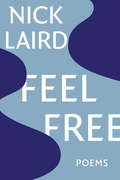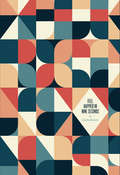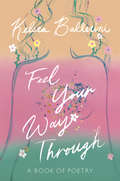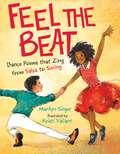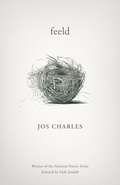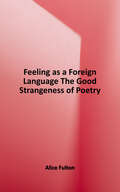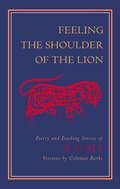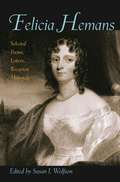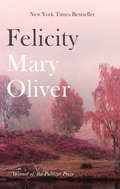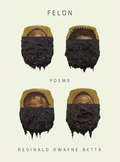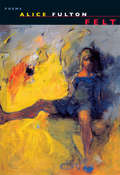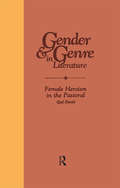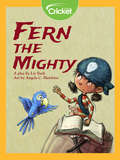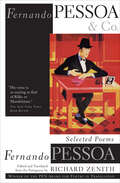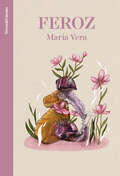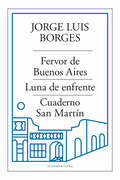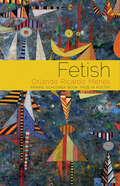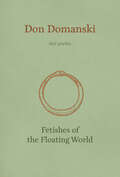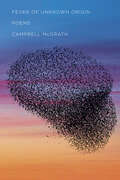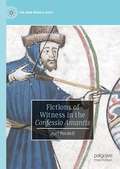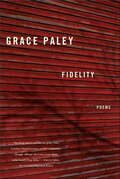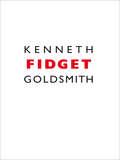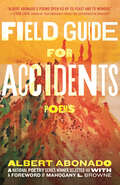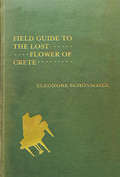- Table View
- List View
Feel Free: Poems
by Nick LairdShortlisted for the 2018 T. S. Eliot Prize “Nick Laird’s dazzling poems arrive with a kind of revolutionary candor; a truth-telling that’s political, existential, and above all, emotional.… Feel Free is essential poetry.”—Terrance Hayes Feel Free, the fourth collection from acclaimed poet Nick Laird, effortlessly marries the acoustic expansiveness of Whitman or Ashbery with the lyricism of Laird’s forebears Heaney, MacNeice, and Yeats. With characteristic variety, invention, and wit, Laird explores the patterns of freedom and constraint—the family, the impress of history, the body itself—and how we might transcend them. Always daring, always renewing, Feel Free is Laird’s most remarkable work to date.
Feel Happier in 9 Seconds
by Linda BesnerI learned the secret of serenity by waterboarding daffodils. My Buddha is landfill. My mantra choked from a bluebird’s neck. It’s ruthless, the pursuit of happiness. Eighteen seconds have elapsed. This collection is a universe where minimalism and maximalism work in harmony. Ethics, economics, glamour and alternative physics are just a few of the vehicles Besner uses in her jaundiced pursuit of knowledge and joy. At the collection’s core is a series of brilliantly illuminated poems patterned on a scientific study of synaesthesia and Fisher Price refrigerator magnets. Besner’s courageous comparisons and musicality provide the critical happiness we all need. ‘Besner’s imagination doesn’t appear to have an upper or outer limit … Reading her poems is a bad trip and a transformational experience.’ – Ken Babstock ‘Besner is one of the funniest poets writing in this country.’ – National Post
Feel Your Way Through: A Book of Poetry
by Kelsea BalleriniThe personal and poignant debut poetry collection from the award-winning singer, songwriter, and producer revolves around the emotions, struggles, and experiences of finding your voice and confidence as a woman. &“I&’ve realized that some feelings can&’t be turned into a song . . . so I&’ve started writing poems. Just like my songs, they are personal and honest. Just like my songs, they have hooks and rhymes. Just like my songs, they talk about what it&’s like to be twenty-something trying to navigate a wildly beautiful and broken world.&” Deeply emotional and candid, Feel Your Way Through explores the challenges and celebrates the experiences faced by Kelsea Ballerini as she navigates the twists and turns of growing into a woman today. In this book of original poetry, Ballerini addresses themes of family, relationships, body image, self-love, sexuality, and the lessons of youth. Her poems speak to the often harsh, and sometimes beautiful, onset of womanhood. Honest, humble, and ultimately hopeful, this collection reveals a new dimension of Ballerini&’s artistry and talent.
Feel the Beat: Dance Poems that Zing from Salsa to Swing
by Marilyn SingerAn irresistible book of poems about dancing that mimic the rhythms of social dances from cha-cha to two-step, by the acclaimed author of Mirror Mirror Marilyn Singer has crafted a vibrant collection of poems celebrating all forms of social dance from samba and salsa to tango and hip-hop. The rhythm of each poem mimics the beat of the dances&’ steps. Together with Kristi Valiant&’s dynamic illustrations, the poems create a window to all the ways dance enters our lives and exists throughout many cultures. This ingenious collection will inspire readers to get up and move!Included with the e-book is an audio recording of the author reading each poem accompanied by original music.
Feeld
by Jos CharlesSelected by Fady Joudah as a winner of the 2017 National Poetry Series, Jos Charles's revolutionary second collection of poetry, feeld, is a lyrical unraveling of the circuitry of gender and speech, defiantly making space for bodies that have been historically denied their own vocabulary. "i care so much abot the whord i cant reed." In feeld, Charles stakes her claim on the language available to speak about trans experience, reckoning with the narratives that have come before by reclaiming the language of the past. In Charles's electrifying transliteration of English--Chaucerian in affect, but revolutionary in effect--what is old is made new again. "gendre is not the tran organe / gendre is yes a hemorage." "did u kno not a monthe goes bye / a tran i kno doesnt dye." The world of feeld is our own, but off-kilter, distinctly queer--making visible what was formerly and forcefully hidden: trauma, liberation, strength, and joy. Urgent and vital, feeld composes a new and highly inventive lyrical narrative of what it means to live inside a marked body.
Feeling as a Foreign Language: The Good Strangeness of Poetry
by Alice FultonIn this book, award-winning poet and critic Alice Fulton considers poetry's uncanny ability to access and recreate emotions so wayward they go unnamed. How does poetry create feeling? What are fractal poetics? In a series of provocative, beautifully written essays concerning "the good strangeness of poetry," Fulton contemplates the intricacies of a rare genetic syndrome, the aesthetics of complexity theory, and the need for "cultural incorrectness." She also meditates on electronic, biological, and linguistic screens; falls in love with an outrageous 17th-century poet; argues for a Dickinsonian tradition in American letters; and calls for courageous poetics of "inconvenient knowledge."
Feeling the Shoulder of the Lion: Poetry and Teaching Stories of Rumi
by Jalaluddin RumiThese selections from Rumi's Mathnawi—a classic of Sufi spiritual literature—express the "lion's roar" of courage, discipline, clarity, and integrity. The lion represents the fierce intensity that recognizes no authority except the highest truth. At the same time, Rumi's lion is full of heart and devotion. Through these poems the reader will explore the qualities that are vital to the spiritual aspirant who seeks to overcome the imprisonment of ego.
Felicia Hemans: Selected Poems, Letters, Reception Materials
by Susan J. WolfsonThe first standard edition of the writings of Felicia Hemans (1793-1835), this volume marks a revival of interest in, and a new critical appreciation of, one of the most important literary figures of the early nineteenth century. A best-selling poet in England and America, Felicia Hemans was regarded as leading female poet in her day, celebrated as the epitome of national "feminine" values. However, this same narrow perception of her work eventually relegated Hemans to an obscurity lightened occasionally by parody and a sentimental enthusiasm for poems such as "The Landing of the Pilgrim Fathers" and "Casabianca." Only now is Hemans's work being rediscovered and reconsidered--for the complexity of its social and political vision, but also for its sounding of dissonances in nineteenth-century cultural ideals, and for its recasting of the traditional canon of male "Romantics."Offering readers a firsthand acquaintance with the remarkable range of Hemans's writing, this volume includes five major works in their entirety, along with a much-admired aggregate, Records of Woman. Hemans's letters, many published here for the first time, reflect her views of her contemporaries, her work, her negotiations with publishers, and her emerging celebrity, while reviews and letters from others--including Lord Byron, Walter Scott, and the Wordsworths--tell the story of Hemans's reception in her time. An introduction by editor Susan Wolfson puts these writings, as well as Hemans's life and work, into much-needed perspective for the contemporary reader.
Felicity: Poems
by Mary Oliver'And just like that, like a simpleneighbourhood event, a miracle istaking place.''If I have any secret stash of poems, anywhere, it might be about love, not anger,' Mary Oliver once said in an interview. Finally, in Felicity, we can immerse ourselves in Oliver's love poems. Here, great happiness abounds. Our most delicate chronicler of physical landscape, Oliver has described her work as loving the world. With Felicity she examines what it means to love another person. She opens our eyes again to the territory within our own hearts; to the wild and to the quiet. In these poems, she describes - with joy - the strangeness and wonder of human connection.
Felon: Poems
by Reginald Dwayne BettsA searing volume by a poet whose work conveys "the visceral effect that prison has on identity" (Michiko Kakutani, New York Times). Felon tells the story of the effects of incarceration in fierce, dazzling poems—canvassing a wide range of emotions and experiences through homelessness, underemployment, love, drug abuse, domestic violence, fatherhood, and grace—and, in doing so, creates a travelogue for an imagined life. Reginald Dwayne Betts confronts the funk of postincarceration existence and examines prison not as a static space, but as a force that enacts pressure throughout a person’s life. The poems move between traditional and newfound forms with power and agility—from revolutionary found poems created by redacting court documents to the astonishing crown of sonnets that serves as the volume’s radiant conclusion. Drawing inspiration from lawsuits filed on behalf of the incarcerated, the redaction poems focus on the ways we exploit and erase the poor and imprisoned from public consciousness. Traditionally, redaction erases what is top secret; in Felon, Betts redacts what is superfluous, bringing into focus the profound failures of the criminal justice system and the inadequacy of the labels it generates. Challenging the complexities of language, Betts animates what it means to be a "felon."
Felt: Poems
by Alice FultonWinner of the Bobbitt National Prize for Poetry from the Library of Congress, chosen by the Los Angeles Times as one of the Best Books of 2001, and as a finalist for the Los Angeles Times Book Award. In this groundbreaking collection, Alice Fulton weds her celebrated linguistic freshness to a fierce emotional depth. Felt--a fabric made of tangled fibers--becomes a metaphor for the interweavings of humans, animals, and planet. But Felt is also the past tense of "feel." This is a book of emotions both ordinary and untoward: the shadings of humiliation, obsession, love, and loneliness--as well as states so subtle they have yet to be named. Reticent and passionate, elliptical yet available, Fulton's poems consider flaws and failure, touching and not touching. They are fascinated with proximity: the painter's closeness to the canvas, the human kinship with animals, the fan's nearness to the star. Privacy, the opening and closing of doors, is at the heart of these poems that sing the forms of solitude-the meanings and feelings of virginity, the single-mindedness of fetishism, the tragedy of suicide. Rather than accept the world as given, Fulton encounters invisible assumptions with magnitude and grace. Hers is a poetry of inconvenient knowledge, in which the surprises of enlightenment can be cruel as well as kind. Felt, a deeply imagined work, at once visceral and cerebral, illuminates the possibilities of twenty-first century poetry.
Female Heroism in the Pastoral (Gender and Genre in Literature #Vol. 2)
by Gail DavidThe past decade has given us explorations of such forms as the Bildungsroman, the Kunstleroman, the utopian and Gothic novel as women have written them; studies are even now emerging of the female-authored elegy, sonnet sequence and other pure and mixed poetic modes. Women’s work in non-fiction prose and in the dramatic genres is being resurrected and reassessed. At the same time, feminist critics continue to deconstruct women as signs in patriarchal literary forms, explaining the effect of male gender on structures of signification, the narrative and stylistic codes of genre. This series welcomes such studies, encouraging as well accounts of sexuality and textual inheritance, the influence of female authorship on the evolution of a genre or the creation of a new genre, and challenges to genre theory from a gender perspective.
Fern the Mighty
by Liz SiedtThis pirate ship crew is about to discover its most valuable resource: Fern the Mighty!
Fernando Pessoa & Co.: Selected Poems
by Richard Zenith Fernando PessoaFernando Pessoa (1888–1935) - a poet who lived most his life in Lisbon, Portugal, and who died in obscurity there - has in recent years gained international recognition as one of the greatest writers of the twentieth century. Now Richard Zenith has collected in a single volume all the major poetry of one of the most extraordinary poetic talents the century has produced (Microsoft Network's Reading Forum). Fernando Pessoa was as much a creator of personas as he was of poetry, prose, and criticism. He wrote under numerous heteronyms, literary alter egos with fully fleshed identities and writing styles, who supported and criticized each other's work in the margins of his drafts and in the literary journals of the time. From spare minimalism to a revolutionary exuberance that recalls Leaves of Grass, Pessoa's oeuvre was radically new and anticipated contemporary literary concerns to an unnerving degree. The first comprehensive edition of Pessoa's poetry in the English language, Fernando Pessoa & Co. is a work of extraordinary depth and poetic precision. Zenith's selection of Pessoa is a beautiful one-volume course in the soul of the twentieth century. — Booklist
Feroz
by María VeraMaría Vera compone a través de poemas y prosas poéticas una carta abierta a una generación atormentada por la fugacidad y el miedo a sentirse. Un libro sobre cómo lo salvaje y lo instintivo del ser humano sale a la luz ante el dolor. «De niña jugaba dentro de la piscina hasta que mis labios se teñían de azul violáceo. Hacerse mayor es decidir pintarlos de rojo para tapar todo ese frío. Para que no se transparente la rasgadura, lo humano, la fragilidad, la sombra. Pero esta hambre, ¿cómo se oculta?». Los instintos, aquellos que nos condicionan, reductos de nuestra animalidad, pero también los que nos divierten, los que nos invitan a seguir apostando a este juego peligroso de vivir, son los protagonistas de este manifiesto colectivo. María Vera compone en estas páginas a través de poemas y prosas poéticas una carta abierta a una generación atormentada por la fugacidad y el miedo a sentirse.
Fervor de Buenos Aires – Luna de enfrente – Cuaderno San Martín
by Jorge Luis BorgesFervor de Buenos Aires (1923) es el primer libro que publica Borges. Casi medio siglo después dirá de él que «prefigura todo lo que haría después». Este volumen suma a Fervor los dos libros que siguieron en su producción poética: Luna de enfrente (1925) y Cuaderno San Martín (1929), y se propone como homenaje a su escritura y celebración de su genio.«En la honda noche universal que apenas contradicen los faroles una racha perdida ha ofendido las calles taciturnas como presentimiento tembloroso del amanecer horrible que ronda los arrabales desmantelados del mundo». Fervor de Buenos Aires (1923) es el primer libro que publica Borges. El poemario, en una modesta edición de trescientos ejemplares pagada por su padre, está dedicado a su madre y lleva en su tapa un grabado de su hermana Norah. En el prólogo a la edición de 1969, aquella que se sigue aquí, Borges dice que no reescribió el libro, sino que se limitó a mitigar excesos barrocos, limar asperezas y tachar sensiblerías y vaguedades; al mismo tiempo afirma: «Para mí, Fervor de Buenos Aires prefigura todo lo que haría después».
Festivals
by Myra Cohn LivingstonPoems celebrating fourteen festivals observed around the world including Chinese New Year, Kwanzaa, Purim, and Tet-Nguyen-dan.
Fetish: Poems (The Raz/Shumaker Prairie Schooner Book Prize in Poetry)
by Orlando Ricardo MenesFrom sensual pleasures and perils, moments and memories of darkness and light, the poems in Orlando Ricardo Menes&’s collection sew together stories of dislocation and loss, of survival and hope, and of a world patched together by a family over five generations of diaspora. This is Menes&’s tapestry of the Americas. From Miami to Cuba, Panama to Bolivia and Peru, through the textures, sounds, colors, shapes, and scents of exile and emigration, we find refuge at last in a sense of wholeness and belonging residing in this intensely felt, finely crafted poetry.
Fetishes of the Floating World
by Don DomanskiGovernor General's Award–winning poet Don Domanski's posthumous last collection once again melds perception-expanding environmental poetry and metaphysics into a seamless, moving lyric whole. Fetishes of the Floating World continues Don's lifelong exploration of mystical ecology. It is an invitation to experience the sacred dimensions of what-is and to become more intimate with the strangeness that haunts our lively, changeable world. Here is a spirituality that doesn't turn its back on the material and immerses us in earthly being. The sustained apprehension of deep time underlies every moment of this work; every moment is held up against that more-than-human span and is relinquished to it. Domanski's full-bodied, incantatory language will penetrate your very marrow, calling you out of yourself to testify to the world's "inclement graces." "Domanski’s poems are intimate, but intimate on a grand scale. As far as I am concerned, there is no better poet writing in English."–Mark Strand on All Our Wonder Unavenged
Fever of Unknown Origin: Poems
by Campbell McGrathA collection of profound and piercing poems from a finalist for the Pulitzer Prize about navigating the modern world in search of beauty that will endureFever of Unknown Origin opens at a remote crossroads, where the speaker considers the intersection of history, beauty, and destruction: &“the past / is paper / and the present, a match . . .&” What follows is an urgent tour of landscapes—environmental, political, and personal—that reframes our perception of modern America and leads the reader into &“An empire of rags and photons&” where we must look to the past to clarify our futures.With sublime wit and a Whitmanian eye, McGrath delivers a stunning collection of warnings, love letters, and praise songs for all that manages to weather the perennial pressures of time: frog ponds, stadium rubble, and the endless cycle of seasons, which usher us deeper into an era we cannot yet know.
Fictions of Witness in the Confessio Amantis (The New Middle Ages)
by Joel FredellFictions of Witness in the Confessio Amantis details the first years of the Confessio’s material history and offers a major revision to a century’s old narrative of political revision and conversion around the trauma of 1400. Joel Fredell argues for “late stage” revisions by Gower to his great poem in Middle English from the late 1390s up to Gower’s death in 1408. This approach, new to scholarship for Ricardian and Lancastrian literature, demands profound re-evaluation of Gower's poetic persona and its entanglement in the opening and closing books of the Confessio. It offers a reassessment of the political and literary relationships between versions dedicated to Richard II and Henry IV. It repositions Gower's laureate status in a London world of deluxe book production that created a canon of Ricardian poets linked to their fifteenth-century inheritors. Finally, it identifies for the first time how late medieval authors designed their poetry as fictional artifacts that witness history from quasi-chronicles like Maidstone’s Concordia or Richard the Redeless, quasi-petitions like the Lollard “Petition to the King and Parliament,” quasi-epistles that begin so many texts, quasi-transcripts such as the Record and Process of the Deposition of Richard II, and so on.
Fidelity: Poems
by Grace PaleyJust before her death in 2007 at the age of eighty-four, Grace Paley completed Fidelity, a wise and poignant book of poems. Full of memories of friends and family and incisive observations of life in both her beloved hometown, New York City, and rural Vermont, the poems are sober and playful, experimenting with form while remaining eminently readable. They explore the beginnings and ends of relationships, the ties that bind siblings, the workings of dreams, the surreal strangeness of the aging body—all imbued with her unique perspective and voice. Mournful and nostalgic, but also ruefully funny and full of love, Fidelity is Grace Paley's passionate and haunting elegy for the life she was leaving behind.
Fidget
by Kenneth GoldsmithThe follow-up to the critically acclaimed No. 111, Fidget ruthlessly documents every movement made by Goldsmith's body on Bloomsday (June 16) 1997 from 10 am to 11 pm. Literary critic Marjorie Perloff compares Fidget to 'a Beckett prose text.'
Field Guide for Accidents: Poems (National Poetry Series #9)
by Albert AbonadoSELECTED BY MAHOGANY L. BROWNE FOR THE NATIONAL POETRY SERIESAn irreverent poetry collection that wrestles with questions of family, mortality, cultural history, and identity from the Filipinx-American experience "you showed him your teeth, you dared him to look into your mouth to see the metal bands straightening your jaw into an American smile."—from Field Guide for AccidentsBorn in the United States to Filipino immigrants, poet Albert Abonado is no stranger to the language of periphery. Neither wholly &“American&” nor Filipino, Field Guide for Accidents&’s speakers are defined by what they are not: not white enough to be born in America, not Asian enough to feel at home in the Philippines. Abonado&’s poetry illuminates the strange and surreal in domestic routine, suturing wounds of love, grief, and the contradiction of being Filipinx-American, two identities bound with a hyphen that resists negation. What results is a growing exposure to a world mired in paradox.The poems in Field Guide for Accidents experiment with the constraints of the poetic line, shaping forms that exhume what tend to haunt us in the silence. In Field Guide for Accidents, memory becomes augmented with the imaginary; suspicion collides with superstition, while spirituality crosses paths with scientific fact. A mother returns to her son as a boat. A stew is prepared with blood yet masked as chocolate. The living eat with the dead in memories built like houses. Mythic, bloodthirsty creatures in Pinoy folklore prey on an exhausted poet. Research conducted in hindsight provides new avenues to explore regret.For many third-culture kids of the Asian-American diaspora, there is no such thing as a success story for &“fitting in.&” What matters more is finding where you belong. Spooning images from hand to mouth, the poems in Field Guide for Accidents struggle with what it means to consume and be consumed by American culture.
Field Guide to the Lost Flower of Crete (Hugh MacLennan Poetry Series #58)
by Eleonore SchönmaierThyme clings, high / and away from the grazing and scents / the air.Island reality is interconnected with live-retrieved memories in which a nurse follows a violent patient into the northern Canadian bush, a migrant mother faces her new job as the village butcher, an Ojibway man is forced to walk a dangerous route home alone, teenagers loot the local dump to build their mother's wheelchair, and an electrician watches a woman play a grand piano on a ballfield.A (re)creation of the surreality and altered time within deep states of grieving, Field Guide to the Lost Flower of Crete juxtaposes sorrow with fragmentary unapologetic joy. Eleonore Schönmaier forges compelling symphonic resonances between European musical encounters and a northern working-class childhood. By centring her experiential empathy on a history of racism and poverty, she guides us into better ways of being. Intimate reflections are contrasted with geopolitical and environmental concerns as Schönmaier's fierce intelligence focuses on what is most essential in our lives.The arc of this collection offers a rejuvenating meditation on the meaning of loss and love, highlighted by the lyric beauty of the writing.
